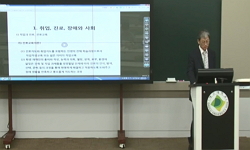앞으로의 21세기 정보사회, 지식기반사회는 정보기술과 함께 폭증하는 정보의 홍수 속에서 가치있는 정보를 선택, 판단하고 활용할 수 있는 정보활용능력이 변화 추진의 주요한 원동력이 되...
http://chineseinput.net/에서 pinyin(병음)방식으로 중국어를 변환할 수 있습니다.
변환된 중국어를 복사하여 사용하시면 됩니다.
- 中文 을 입력하시려면 zhongwen을 입력하시고 space를누르시면됩니다.
- 北京 을 입력하시려면 beijing을 입력하시고 space를 누르시면 됩니다.

제7차 교육과정과 진로교육강화방안 = The 7th National School Curriculum and Strategies to Strengthen Career Education
한글로보기부가정보
국문 초록 (Abstract)
앞으로의 21세기 정보사회, 지식기반사회는 정보기술과 함께 폭증하는 정보의 홍수 속에서 가치있는 정보를 선택, 판단하고 활용할 수 있는 정보활용능력이 변화 추진의 주요한 원동력이 되는 사회로 예견되고 있다. 이러한 지식정보사회로의 급속한 이행은 교육을 둘러싸고 있는 내외적인 체제와 환경의 변화와 수요자인 학습자 중심 교육과정으로의 교육 패러다임이 전환되어야 함을 시사하고 있다.
2002년부터 본격적으로 실시되는 제7차 교육과정은 이러한 변화에 대한 요구를 적극 수용하여 세계화·정보화 시대를 주도할 자율적이고 창의적인 한국인 육성을 기본 방향으로 하고 학생의 적성, 능력, 진로에 적합한 학습자 중심 교육의 실천을 그 방법으로 제시하고 있어 진로교육과 매우 밀접한 관련이 있다. 이 글에서는 제7차 교육과정을 통하여 진로교육을 어떻게 하면 강화시킬 수 있을 것인가를 살펴보고자 한다.
개인의 전생애 진로발달 과정에 있어 각급 학교에서의 진로교육은 매우 중요하다. 그런 만큼 학교 교육과정의 정규 교과로서 진로교육을 실시하는 것이 절실히 요청된다고 하겠다. 따라서 각급학교에서는 학생들이 진로에 관심을 갖고 자신의 진로를 적극적으로 탐색, 개척, 준비할 수 있도록 활동 중심의 교육 운영 방안을 마련하는 것이 시급하다. 이를 위해서는 운영 방법에서부터 교육 내용, 교수 방법에 이르기까지 학생 중심의 교육이 이루어질 수 있도록 진로담당교사는 물론 전교과 담당 교사들의 적극적인 이해와 노력이 뒷받침되어야 한다.
다국어 초록 (Multilingual Abstract)
The 21st century is forecast as in information society and a knowledge-based society where the capacity to identify, select and utilize what is valuable among the vast flood of information will be a major force for promoting change. The rapid transiti...
The 21st century is forecast as in information society and a knowledge-based society where the capacity to identify, select and utilize what is valuable among the vast flood of information will be a major force for promoting change. The rapid transition toward such an information and knowledge-based society calls for a shift in the system and the environment of education and a transition toward an educational paradigm of learner-centered curriculum.
The 7th national school curriculum, which went into implementation in 2002, was designed to meet the demands for these changes in the educational sector. The new curriculum aims to raise independent and creative human resources who can lead the age of globalization and informationzation. As one way of achieving this goal, the national curriculum seeks to realize a learner-centered education, which accommodates the conditions of learners' aptitude, capacity, and career plans. In this vein, the curriculum is closely related to career education. This article makes suggestions on how career education may be strengthened through the implementation of the 7th national school curriculum.
Career education in the school is a critical factor affecting an individual's lifelong career development. It is thus essential that career education is provided to the students as a formal component of the school curriculum. Schools at different levels should include in their programs activities that encourage students to take greater interest in their career, and furthermore to actively investigate, explore and prepare for their career possibilities. Prerequisite to making this accomplishment is the concerted effort of not only the career guidance counselors but of all teachers in the schools to provide their students with learner-centered education in terms of both content and methodology.
동일학술지(권/호) 다른 논문
-
- 한국경제교육학회
- 김재원 ( Jae Won Kim )
- 2002
- KCI등재
-
- 한국경제교육학회
- 김찬진
- 2002
- KCI등재
-
- 한국경제교육학회
- 金正浩
- 2002
- KCI등재
-
- 한국경제교육학회
- 김용조
- 2002
- KCI등재





 KISS
KISS






